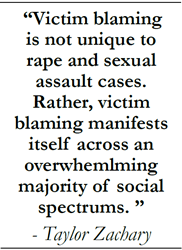By: Taylor Zachary
In a recent edition of the Newswire, Brittany Welch provided Xavier students with a “different perspective on police brutality,” regarding the incidents surrounding Officer Ben Fields versus a non-participatory student in a South Carolina high school classroom. She explicitly urged America to “think before you judge,” and informed us that “the student 16-year-old girl is still at fault.”
In an effort to preserve the acute level of temperance I still possess as a Black male at a predominantly white institution, I will not expend my emotional energy discussing the state of police brutality versus Black and Brown bodies. For further clarification, I wholeheartedly admit the value of contrasting perspectives, but it saddens me to bear witness to another shameless account of victim blaming.
 Victim blaming occurs when the victim of a crime or any wrongful act is held entirely or partially responsible for the harm that befell them. Victim blaming dominates the discourse on rape, especially on university campuses: She shouldn’t have gotten that drunk at a party. She shouldn’t have worn such a revealing outfit. If she didn’t want it, she would have stopped him. Shocked yet?
Victim blaming occurs when the victim of a crime or any wrongful act is held entirely or partially responsible for the harm that befell them. Victim blaming dominates the discourse on rape, especially on university campuses: She shouldn’t have gotten that drunk at a party. She shouldn’t have worn such a revealing outfit. If she didn’t want it, she would have stopped him. Shocked yet?
I yearn for the day our patriarchal society can simply say, “Men should never rape women.” Period.
Needless to say, victim blaming is not unique to rape and sexual assault cases. Rather, victim blaming manifests itself across an overwhelming majority of social spectrums, from racial discrimination to domestic violence.
For example, when a video surfaced of Ray Rice beating his wife unconscious, the discourse quickly shifted from Janay Palmer, the victim, to Janay Palmer, the instigator. Oh I forgot, as long as a wife upsets her husband, he has the right to punch her in the face.
To understand the perverse reality of victim blaming, we must seek to understand why social actors turn to this approach. According to Dr. Julianan Breines, “Victim blaming is not just about culpability — it’s also about avoiding vulnerability. The more innocent a victim, the more threatening they are. Victims threaten our sense that the world is a safe and moral place, where good things happened to good people and bad things happen to bad people.” This makes sense to me.
In recent campus discussions about racism and sexism, a significant number of my fellow students divorce themselves from addressing the fact that “those things,” as they are referenced, occur at Xavier.
As a result, conversations end with classic forms of victim blaming rhetoric such as, get over it or boys will be boys. For them, blaming the victim is easier than accepting the harsh reality that shameful injustices occupy the presumed sanctuary of the Xavier bubble.
Victim blaming is the reason Sam Dubose is blamed for his murder. Apparently, he should have gotten out of the car. Victim blaming is the reason why one in four women will be the victim of sexual assault during their academic career. Or have I misused the word victim?
I completely understand that Brittany may not have intentionally sought to blame the victim in this situation. Also, I understand that she does not

approve of the officer’s actions. She writes, “While I believe he should have handled himself in a more mature manner, the student is still at fault. She assaulted an officer by punching him. That is ultimately the reason he had to use force to begin with.” As aforementioned, I will not get into a discussion about the state of policing in America.
Discourse will open an undesired can of worms. Nevertheless, Brittany’s rhetoric serves as a classic and explicit example of victim blaming. “While I believe he should have handled himself in a more mature manner, the student is still at fault.”
Divorce this statement from the context of the South Carolina police brutality case, change the word student to Janay Palmer, and this statement beautifully serves as an introduction to address domestic violence in the Ray Rice incident. Not satisfied?
Remove this statement from the context of the South Carolina police brutality case, keep the word student, and this statement serves as response to that one woman, of four, who was raped during her academic career.
By diverting promising discourse away from sources of oppression, victim blaming beautifully upholds and effortlessly secures systems of violence and discrimination toward socially disadvantaged groups. I urge you all, please think before you judge.












You must be logged in to post a comment.